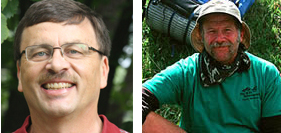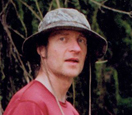Wilderness More Important than Ever
by Kevin Proescholdt and Howie Wolke
 Christopher Solomon got it wrong in so many ways in his July 6 New York Times editorial, “Rethinking the Wild: The Wilderness Act Is Facing A Midlife Crisis”. The history of the wilderness movement and of the 1964 Wilderness Act shows how wrong and myopic he was. In fact, the visionary Wilderness Act is needed now more than ever.
Christopher Solomon got it wrong in so many ways in his July 6 New York Times editorial, “Rethinking the Wild: The Wilderness Act Is Facing A Midlife Crisis”. The history of the wilderness movement and of the 1964 Wilderness Act shows how wrong and myopic he was. In fact, the visionary Wilderness Act is needed now more than ever.
Solomon bases his argument on a fundamental misunderstanding of the meaning and value of Wilderness. He argues that since all Wildernesses are affected by anthropogenic climate change, human manipulation of Wilderness is now acceptable -- even desirable, since the genie is already out of the bottle. Intervene and manipulate without constraint, he proclaims. But this approach contradicts the very idea of Wilderness.
Mr. Solomon obviously confuses wildness with absolute pristine conditions. Congress never intended to set the bar so high that only entirely natural and pristine areas could qualify for Wilderness designation. Humanity’s global imprint is not new. Climate change is but the latest in a long history of human impacts to every corner of the planet, from smog and acid rain to habitat fragmentation and widespread human-caused extinctions.
A basic understanding of the Wilderness Act helps us understand the value of the uniquely American wilderness idea. A half-century ago, Congress defined Wilderness as “an area where the earth and its community of life are untrammeled by man, where man himself is a visitor who does not remain.” Untrammeled means un-manipulated or unconfined, requiring humility and restraint, to allow Wilderness to function without the heavy-handed human manipulations that characterize most of the world.
Human impacts have never disqualified areas from becoming Wilderness. But once Congress designates a Wilderness, manipulations and interventions must cease. Fortunately, there still remain large untrammeled landscapes where human impacts are “substantially unnoticeable” and where “wilderness character” dominates.
The Wilderness Act’s primary author was Howard Zahniser. His thoughts and writings are central to what the Wilderness Act means, and Solomon would benefit by studying them. Zahniser wrote, for example, that (unlike Solomon’s contention of the central importance of absolute pristine conditions) it is wildness that is central to Wilderness. “We must remember always that the essential quality of the wilderness is its wildness,” Zahniser explained, and his choice of “untrammeled” in the poetic definition of wilderness in the 1964 law was intended to protect that core character of wilderness.
Solomon also repeats the misconception that Zahniser and other Wilderness System founders never anticipated threats to Wilderness like climate change. On the contrary, Zahniser anticipated the very calls like Solomon’s for manipulating Wilderness when he wrote, “Such tracts should be managed so as to be left unmanaged.” And he defined wilderness as a place where human impacts are “substantially unnoticeable”, not entirely absent.
Change is constant in wild nature; Mr. Solomon is obviously unaware that wilderness enthusiasts have long acknowledged this. Once again, Howard Zahniser provided the needed guidance: “In the wilderness we should observe change and try not to create it!” Even though changes may occur in Wilderness that we humans may not like, the true test of our commitment to the Wilderness idea is to exercise that humility and restraint and eschew intervention.
Zahniser anticipated calls to manipulate Wilderness, even for seemingly beneficial-sounding reasons such as some of those Solomon proposed. That’s why Zahniser famously wrote, “With regard to areas of wilderness we should be guardians and not gardeners.”
So while modern human impacts certainly tempt us to try to “fix” whatever we perceive to be wrong or undesirable, let us not forget that such efforts often backfire, simply because nature is far more complex than we can perceive. And such efforts in wilderness would eliminate wildness and the contrast between wilderness and the rest of the planet.
On this increasingly human-dominated planet, un-manipulated wild Wilderness now has more value than ever. Solomon concludes that Wilderness manipulation is a “necessary apostasy to show how much we truly revere these wild places.” Yet if we follow his suggestions and manipulate the wildness out of Wilderness, there will be no wild places left. And that is exactly what the Wilderness Act guards against.
----------
Kevin Proescholdt is the Minnesota-based Conservation Director for Wilderness Watch, a national wilderness conservation organization. Howie Wolke co-owns Montana-based Big Wild Adventures and has been a wilderness guide/outfitter for 36 years. He is the current Vice President of Wilderness Watch. Each has been actively involved with wilderness conservation for over 40 years.

